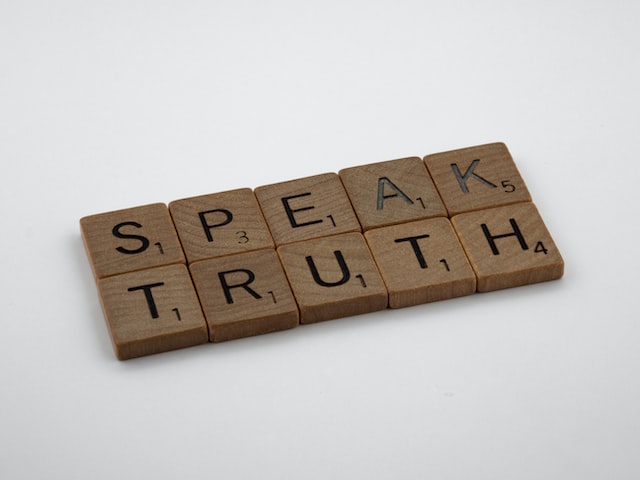William Shakespeare wrote, “No legacy is so rich as honesty.” Indeed, in this life, honesty is of the utmost importance. This is especially true for Christians. Truth is a fundamental aspect of our faith and a core principle that guides our actions and relationships. Therefore, we cannot be Christians and live in dishonesty.
From the teachings of Jesus to the words of the prophets, the Bible is replete with references to honesty and integrity. In this blog post, we will explore why truth matters in Christianity and the crucial role it plays in our spiritual lives.
We will delve into the Bible’s teachings on truth and honesty and examine how these principles apply to day-to-day living. Ultimately, this discourse aims to highlight the importance of honesty and truth in our faith. It will also encourage readers to strive for greater integrity in their thoughts, words, and actions.
The Bible’s Teachings on Truth and Honesty
The Bible emphasizes the importance of living a life of integrity. In Proverbs 12:22, it states, “Lying lips are an abomination to the Lord, but those who act faithfully are his delight.” This verse clearly communicates that dishonesty is unacceptable in the eyes of God and that truthfulness is highly valued.
Another passage that provides guidance on honesty and truthfulness is Colossians 3:9-10. Here, Paul writes, “Do not lie to one another, seeing that you have put off the old self with its practices and have put on the new self, which is being renewed in knowledge after the image of its creator.” This passage encourages us to put off our old ways of deceit and dishonesty and to put on the new self, characterized by truthfulness and authenticity.
Meanwhile, in his letter to the Ephesians, Paul writes, “Therefore, having put away falsehood, let each one of you speak the truth with his neighbor, for we are members one of another” (Ephesians 4:25). This verse emphasizes the importance of truthfulness in our relationships with others, reminding us that as members of the body of Christ, we are all interconnected. It also reminds us that honesty is crucial in building strong, healthy relationships.
Honesty and truth are essential principles in our Christian faith, values that we should not take for granted. As believers, we are called to live a life of integrity, speaking the truth in all our relationships and interactions.
The Role of Honesty in Building Trust and Relationships

Speaking of relationships, let’s discuss why truth matters in Christianity, this time in the area of our relationships with other people. You’ve heard many times how communication is key to any relationship. However, communication without honesty and truth will lead you nowhere.
Trust is vital in any relationship, and the foundation of trust is honesty. In order for a relationship to thrive, honesty must be present. The Bible emphasizes the importance of honesty in building trust and maintaining strong relationships.
For instance, James 5:12 reminds us to let our “yes” be “yes” and our “no” be “no,” and that there should be no room for double-mindedness in our lives. When we are honest and do what we say, we build trust with people around us, whether at home, work, or church.
Additionally, Proverbs 24:26 sheds light on the significance of honesty in fostering relationships and trust. Here, Solomon likens an honest response to a kiss, not just any kiss, but a kiss on the lips.
What does this show us other than the fact that honesty is a demonstration of intimacy and love? We build greater connections and relationships with others when we are honest and open with them and do not hide anything from anyone.
The Dangers of Dishonesty and Deception
Deception and dishonesty can have detrimental effects on our interactions with others and our relationship with God. This is a primary reason why truth matters in Christianity.
In personal relationships, dishonesty may take many forms. Adultery, the concealment of financial problems, and lying about one’s history are common examples of deception that take place in relationships. In any of these circumstances, the betrayal of trust can result in hurt, anger, resentment, and rage. These eventually cause the relationship to break down.
The Bible is clear in its condemnation of dishonesty and lies. You will find many places in Scripture that forewarn the risks of leading an untruthful life. Solomon writes in Proverbs 19:9, “A false witness will not go unpunished.”
Being a false witness is not limited to someone who testifies falsely in a legal court. A false witness is someone who swears before others that what they say is true. But then, Scripture reminds us that dishonesty will not go unnoticed or unpunished and that those who engage in deceit will ultimately be held accountable for their actions.
The words of Jesus are even harsher. In John 8:44, he condemns deception with fiery passion and calls liars and dishonest people children of the devil himself. This verse implies that those who engage in deceit are, in a sense, aligning themselves with the devil and his ways, and thus turning away from God.
The Truth Will Set You Free

At the end of the day, only the truth can set us free. It is safe to say that this is the ultimate reason why truth matters in Christianity. Living your life knowing that you are not hiding anything from anyone is the most liberating experience. Jesus is the truth and expects us, his followers, to live in truth.
The remarks of Jesus in John 8:32 is more than just telling the truth; it has a deeper significance. He demands that we not only proclaim the truth but also live it. This implies that our words and deeds should reflect our Christian views and moral principles. Honesty and integrity are necessary for living in the truth, and God longs for them to exist within us.
When we are honest and transparent in our actions and words, we can live a life consistent with our faith. This allows us to experience a sense of peace and freedom, knowing that we are living in a way that is pleasing to God.
Being truthful and transparent can also set us free from guilt and shame. When we live in a way that is not consistent with our beliefs, it can lead to feelings of guilt and shame. However, when we confess our sins and ask for forgiveness, we are able to experience the freedom and cleansing that comes through repentance.
For instance, a Christian who struggles with an addiction may feel trapped by their destructive habit. It’s only by speaking the truth about their condition that they can experience freedom and healing. Similarly, when we lie about something to our friends or loved ones, it’s only by confessing the truth and asking for forgiveness that we can experience a sense of liberation. This act of truthfulness and honesty allows for trust to be rebuilt in our relationships with the people we love.
Putting Off Falsehood and Embracing Truth
Honesty and integrity are essential qualities that are highly valued by God. Being honest means choosing not to steal, cheat or deceive in any way, leading to strength of character and peace of mind.
On the other hand, dishonesty harms not only yourself but also others. Integrity is closely associated with honesty. It means doing what is right at all times, even when no one is watching.
By choosing to put off falsehood and embrace truth and integrity, your thoughts and behavior will be in harmony with the gospel. And when you are not hiding anything, you don’t feel ashamed or afraid to approach God. Therefore, as a follower of Christ, we should always strive to be honest and have integrity in every aspect of our life, whether at work, in our personal lives, or in our relationships with others.
Check out some of our other posts!







